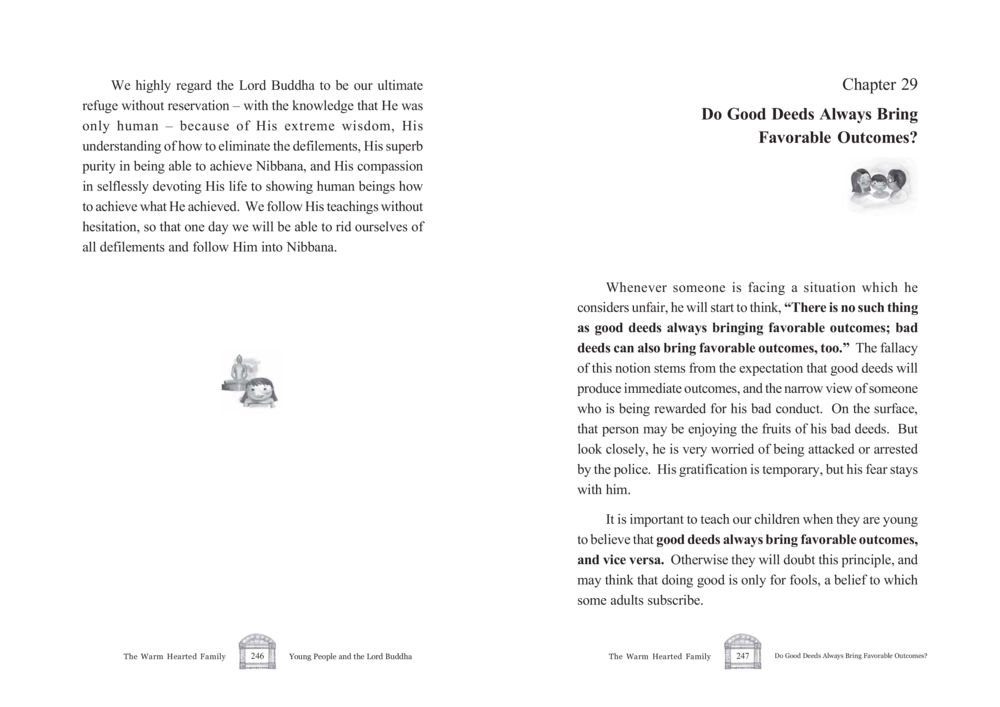The Teachings of the Lord Buddha on Good Deeds : หน้า 124/207
The Warm Hearted Family : หน้า 124/207 Exploring the belief that good deeds lead to favorable outcomes according to the teachings of the Lord Buddha.
0 ครั้ง

สรุปเนื้อหา
This text emphasizes the Lord Buddha as the ultimate refuge for followers seeking Nibbana. It highlights the importance of good deeds and their outcomes, and discusses the misconceptions surrounding the immediate rewards of good and bad actions. It aims to instill in young people the belief that good deeds will ultimately lead to favorable outcomes, despite temporary setbacks that may seem unfair. The teachings encourage families to reinforce positive values in children and promote a consistent practice of good deeds to achieve lasting happiness and peace. For more, visit dmc.tv.
หัวข้อประเด็น
-Lord Buddha's teachings
-the concept of good and bad deeds
-importance of family values
-misconceptions about outcomes
-Nibbana and selflessness
ข้อความต้นฉบับในหน้า
We highly regard the Lord Buddha to be our ultimate
refuge without reservation-with the knowledge that He was
only human because of His extreme wisdom, His
understanding of how to eliminate the defilements, His superb
purity in being able to achieve Nibbana, and His compassion
in selflessly devoting His life to showing human beings how
to achieve what He achieved. We follow His teachings without
hesitation, so that one day we will be able to rid ourselves of
all defilements and follow Him into Nibbana.
Chapter 29
Do Good Deeds Always Bring
Favorable Outcomes?
The Warm Hearted Family
246
Young People and the Lord Buddha
Whenever someone is facing a situation which he
considers unfair, he will start to think, "There is no such thing
as good deeds always bringing favorable outcomes; bad
deeds can also bring favorable outcomes, too." The fallacy
of this notion stems from the expectation that good deeds will
produce immediate outcomes, and the narrow view of someone
who is being rewarded for his bad conduct. On the surface,
that person may be enjoying the fruits of his bad deeds. But
look closely, he is very worried of being attacked or arrested
by the police. His gratification is temporary, but his fear stays
with him.
It is important to teach our children when they are young
to believe that good deeds always bring favorable outcomes,
and vice versa. Otherwise they will doubt this principle, and
may think that doing good is only for fools, a belief to which
some adults subscribe.
The Warm Hearted Family
247
Do Good Deeds Always Bring Favorable Outcomes?
หน้าหนังสือทั้งหมด

1

2

3

4

5

6

7

8

9

10

11

12

13

14

15

16

17

18

19

20

21

22

23

24

25

26

27

28

29

30

31

32

33

34

35

36

37

38

39

40

41

42

43

44

45

46

47

48

49

50

51

52

53

54

55

56

57

58

59

60

61

62

63

64

65

66

67

68

69

70

71

72

73

74

75

76

77

78

79

80

81

82

83

84

85

86

87

88

89

90

91

92

93

94

95

96

97

98

99

100

101

102

103

104

105

106

107

108

109

110

111

112

113

114

115

116

117

118

119

120

121

122

123

124

125

126

127

128

129

130

131

132

133

134

135

136

137

138

139

140

141

142

143

144

145

146

147

148

149

150

151

152

153

154

155

156

157

158

159

160

161

162

163

164

165

166

167

168

169

170

171

172

173

174

175

176

177

178

179

180

181

182

183

184

185

186

187

188

189

190

191

192

193

194

195

196

197

198

199

200

201

202

203

204

205

206

207
หนังสือที่เกี่ยวข้อง
Load More
